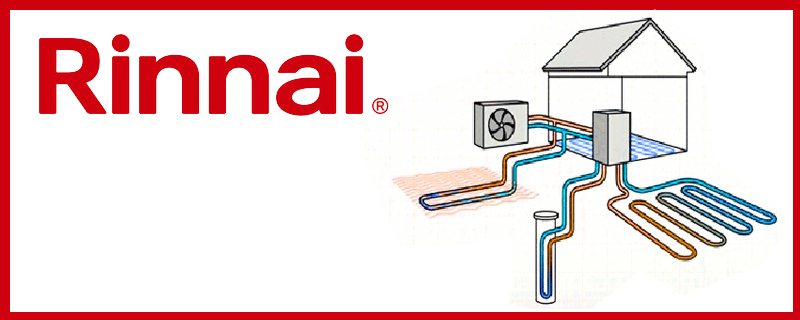RINNAI SUPPORT FOR INSTALLERS ON CONSUMER CONFUSION CONCERNS

Chris Goggin of Rinnai looks at Government policy on low carbon heating and hot water provision which is defined by international pricing, supply chains and political polarisation leading to a rare level of market confusion. This has led to UK customer confusion over which appliance and what fuel should be sourced for heating and hot water needs. Installers & contractors suffer when advising and specifying on behalf of customer due to constant shifts in policy and regular mainstream media misinformation. Here are some reactions to this.
Rinnai has been listening to the concerns of heating engineers and contractors regarding the centralized policy decisions that can result in inadequate heating and hot water provision on many sites. UK policy is aimed at introducing low carbon methods of DHW provision and heating yet is still heavily reliant on natural gas as the national fuel.
It can be argued that heating engineers have not been provided with consistent information on domestic energy policy management by the government. Installers rely on consistent advice passed down from government in order to properly assist customers in selecting the correct hot water and heating system.
UK energy policy makers appear lax in keeping UK consumers and installers fully informed on the wide and expanding range of low carbon & decarbonising products that are currently available. The current strategy, heavily espoused by the main media channels, appears to rely on a narrow band of appliances and fuels, namely heat pumps and electrification.
UK indecision has influenced the stalling of renewable projects and prohibits financial investment in green energy production. In a recent discussion focusing on UK hydrogen between Dr Alan Whitehead MP and Tarmindo. Global, an international renewable investment company, the following concerns were mentioned: A lack of clarity in the long-term hydrogen business model is creating uncertainty across UK hydrogen projects and the wider supply chain. Sustained uncertainty could persuade investors into other markets; and a collective industry concern believes that prolonged indecision will prevent projects from starting, causing further negativity to spread across the UK hydrogen supply chain. Hydrogen project developers are keen for work to begin.
Offshore wind is another area of concern for renewable developers. Despite the UK introducing the CfD (Contracts for Difference) scheme that aims to encourage low carbon electricity generation big business has already begun to stall and halt multiple projects. Swedish wind company Vattenfall has halted construction on a multi-billion-pound offshore wind project – Norfolk Boreas. If completed the wind farm will create enough clean energy for 1.5 million homes. Vattenfall claim the project is no longer profitable due to market circumstances.
We spoke with several installers about this very topic. They are based in the South-East, the most densely populated and most affluent region. The first is a builder/heating contractor who operates at the higher end of the market doing a small number of new builds and conversions each year. He aways asks clients first what they want and then advises according to the practical, economic and technical aspects of the job’s feasibility.
He told us:
“The lack of clarity and decisiveness, of course, makes us look bad and that we don’t know what we are talking about. It seems that everything about NetZero and lowering carbon is forever changing, making it difficult too properly pass on the correct advice.”
When asked on what method of heating and DHW is most enquired about
He said:
“Air source heat pumps and natural gas are the two most popular methods, and little is mentioned about hydrogen – if anything ever at all. We do a fair of amount of commercial works too. They always go for a traditional gas system. Sometimes they go for a system using a heat pump plus auxiliary back-up, or a solar thermal configuration.”
Another business owner/installer said:
“It’s complicated at the moment. Lots of change. However, I don’t think it sullies our reputations, we don’t look bad because of the government. However, they don’t do themselves any favours. When we are asked about what type of heating and hot water delivery system a site wants, most customers ask for natural gas – a small number have asked about installing electrical boilers, but I advised them to stick with gas. There’s so much indecision and poor information coming out of the newspapers and TV. Installers are a lot savvier than we are credited with – we are businessmen and need to give our customers the best possible advice on the practicalities and the costs of heating and hot water.”
An additional business owner who maintains considerable experience across combustion engine design and construction as well as commercial and domestic plumbing believes:
“hydrogen will definitely flow through pipes into houses sometime in the future.” When asked about other forms of renewable power customers enquire about, he said: “heat pumps are an area of interest that clients of mine enquire about, as is solar. But, for now I advise all clients to stick with natural gas. For all the talk of gas being phased out, I can’t see that happening just yet. But I believe hydrogen will happen.”
When asked for his views on communication between government and installers,
He said:
“I’ve had no problems, I stay on top of everything. Although a clear sense of direction would be better for everyone involved.”
Another plumber, interviewed and filmed at the recent Installer Show 2023,
Said:
“There is a pressing need for all of us to stay current with all new developments because there is so much changing in the industry. If you’re not getting on board, you’re going to fall behind.”
Clearer communication that provides customers with a complete range of alternative energy vectors will result in the correct system being installed in the correct property.
Rinnai is designing and producing a comprehensive selection of products, heat pumps, solar thermal, continuous flow water heaters, electric storage tanks, all fuels of gas BioLPG, hydrogen ready appliances and electric, plus a complete range of auxiliary and ancillary products – all available in system format and delivered to site in one complete consignment.
Rinnai is offering a NEW and FREE customer service that designs the ideal heating and hot water system suited specifically to the requirements of the customer’s own site – on or off grid. Rinnai’s H3 range covers existing energy products as well hydrogen, heat pumps and hybrid solar systems. All energy vectors are covered and were designed to help produce savings in all customer costs and carbon emissions.
Rinnai believe that installers could benefit from better levels of communication between the energy industry and policy makers. Without updated and sustained communication, UK customers and heating engineers could continue to see difficultly when designing systems that require a practical, technical and economic approach.
Rinnai understand the complexity of contemporary energy issues and remains committed towards providing technical, economic and feasible options for UK installers and customers alike.
CLICK HERE TO VISIT THE RINNAI WEBSITE
or HERE to EMAIL RINNAI
CLICK HERE For more information on the RINNAI product range

RINNAI’S H3 DECARBONISATION OFFERS PATHWAYS
& CUSTOMER COST REDUCTIONS FOR
COMMERCIAL, DOMESTIC AND OFF-GRID HEATING &
HOT WATER DELIVERY
Rinnai’s H3 range of decarbonising products include hydrogen / BioLPG ready technology, hybrid systems, and a wide range of LOW GWP heat pumps and solar thermal. Also, within Rinnai’s H3 range is Infinity hydrogen blend ready and BioLPG ready continuous flow water heaters which are stacked with a multitude of features that ensure long life, robust & durable use, customer satisfaction and product efficiency.
Rinnai’s range of decarbonising products – H1/H2/H3 – consists of heat pump, solar, hydrogen in any configuration, hybrid formats for either residential or commercial applications. Rinnai’s H3 range of products offer contractors, consultants and end users a range of efficient, robust and affordable decarbonising appliances which create practical, economic and technically feasible solutions. The range covers all forms of fuels and appliances currently available – electric, gas, hydrogen, BioLPG, rDME solar thermal, low GWP heat pumps and electric water heaters.
Rinnai H1 continuous water heaters and boilers offer practical and economic decarbonization delivered through technological innovation in hydrogen and renewable liquid gas ready technology.
Rinnai’s H1 option is centred on hydrogen, as it is anticipated that clean hydrogen fuels will become internationally energy market-relevant in the future; Rinnai water heaters are hydrogen 20% blends ready and include the world’s first 100% hydrogen-ready hot water heating technology.
Rinnai H2 – Decarbonization simplified with renewable gas-ready units, Solar Thermal and Heat Pump Hybrids. Rinnai H2 is designed to introduce a practical and low-cost option which may suit specific sites and enable multiple decarbonisation pathways with the addition of high performance.
Rinnai H3 – Low-GWP heat pump technology made easy – Rinnai heat pumps are available for domestic and commercial usage with an extensive range of 4 – 115kW appliances.
Rinnai’s H3 heat pumps utilise R32 refrigerant and have favourable COP and SCOP.
Rinnai is a world leading manufacturer of hot water heaters and produces over two million units a year, operating on each of the five continents. The brand has gained an established reputation for producing products that offer high performance, cost efficiency and extended working lives.
Rinnai’s commercial and domestic continuous flow water heaters offer a limitless supply of instantaneous temperature controlled hot water and all units are designed to align with present and future energy sources. Rinnai condensing water heaters accept either existing fuel or hydrogen gas blends. Rinnai units are also suited for off-grid customers who require LPG and BioLPG or rDME.
Rinnai products are i2HY20 certified, A-rated water efficiency, accessed through multiple fuel options and are available for purchase 24/7, 365 days a year. Any unit can be delivered to any UK site within 24 hours. Rinnai offer carbon and cost comparison services that will calculate financial and carbon savings made when investing in a Rinnai system. Rinnai also provide a system design service that will suggest an appropriate system for the property in question. Rinnai offer comprehensive training courses and technical support in all aspects of the water heating industry including detailed CPD’s. More information can be found on Rinnai’s website and its “Help Me Choose” webpage.









Leave a Reply
Want to join the discussion?Feel free to contribute!